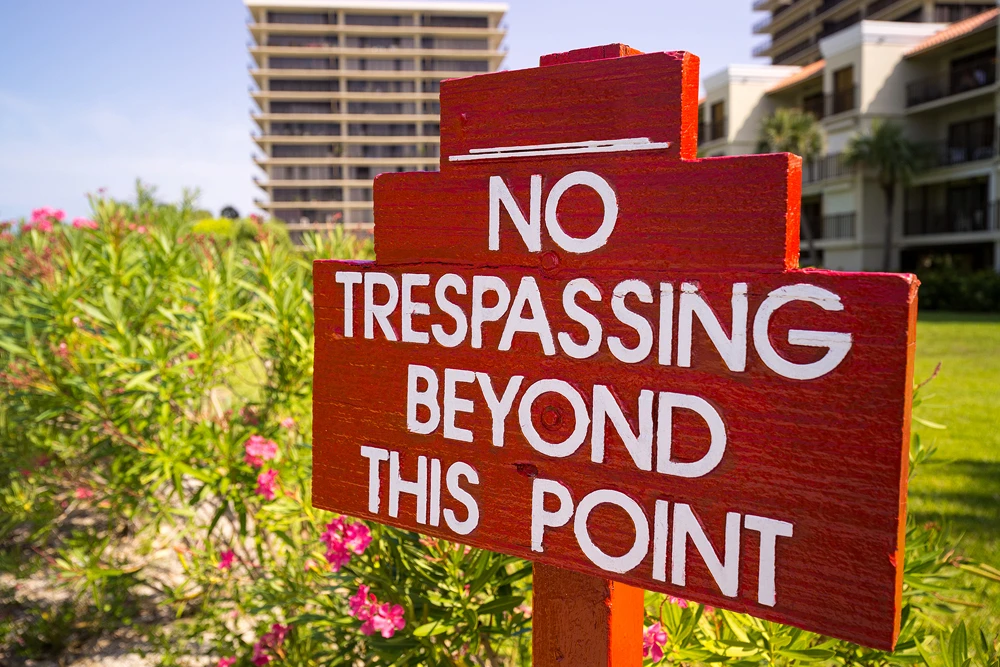Trespassing is defined under common law as entering someone else’s land without permission from the owner. However, that definition is quite basic, as trespassing comprises a wide range of offenses, circumstances, and therefore, penalties.
If charged with trespassing, in which you could be facing a Class 2 or Class 3 misdemeanor, it is important to acquire a Raleigh criminal defense lawyer to fight on your side.
For the leading misdemeanor attorney in the Raleigh area, contact Dewey P. Brinkley today at 919-832-0307 for a free consultation. In meantime, you can find more information about trespassing law below.

In Raleigh and through Wake County, there are essentially two types of criminal, non-domestic trespassing, both of which are described in North Carolina Statutes Chapter 14, Article 22B. The first type, known as first degree trespassing, involves a person entering the property or building of another, without permission, and that property or building is enclosed or secured in a way that clearly shows an intent of keeping out intruders.
For example, first degree trespassing can occur if a rental property owner, who has established authority over who can enter the building via the tenant’s lease, asked a non-tenant to leave and that non-tenant ignores the request by staying or returning. First degree trespassing can carry a Class 2 misdemeanor charge, punishable by up to 60 days in jail.
A person can be charged with second degree trespassing if he/she enters or remains on the premises of another, without permission, and he/she was asked by the owner to not enter or remain or there was reasonably posted signage. Although quite similar to the first degree charge, second degree trespassing is much more common when trespassing on land, as opposed to enclosed or secured buildings.
A third type of trespassing is domestic criminal trespassing (N.C. Gen. Stat. § 14-134.3). In short, this type of trespassing is common among married couples who have separated or divorced, and because of the greater potential for violence and/or other issues in these cases, it is charged as a Class 1 misdemeanor. Domestic trespassing occurs if, after having been forbidden to enter or after having been ordered to leave by the lawful occupant of the home, the trespassing person enters or refuses to leave. Two elements are essential in these cases, including:
A misdemeanor is a serious charge, and it can carry some long term consequences, such as the creation of a criminal record. With years of experience in defending clients charged with trespassing, Raleigh defense attorney Dewey P. Brinkley ensures a comprehensive legal representation as well as an aggressive defense in court.
If you’ve been charged with trespassing, contact Dewey P. Brinkley at 919-832-0307 for a free consultation.

Certified Criminal Law Specialist by North Carolina State Bar.

Tried over 250 criminal cases in local courts.

Knows prosecution strategies from time as Assistant District Attorney.

Direct, responsive service from start to finish by Brinkley himself.

4.9-star client reviews praise professionalism and case outcomes.
Speak directly with Attorney Dewey Brinkley – 100% confidential and no obligation.
Before founding our Criminal Defense Law Firm in Raleigh, Attorney Dewey P. Brinkley worked for almost three years in the Wake County District Attorney’s office, gaining in-depth experience handling domestic violence, misdemeanors and juvenile court offenses.
As a Raleigh Criminal Defense Lawyer, he handles serious felony charges, including armed robbery and attempted murder, as well as DWI, traffic tickets and violations and misdemeanors. Whatever charge you face, we can help.